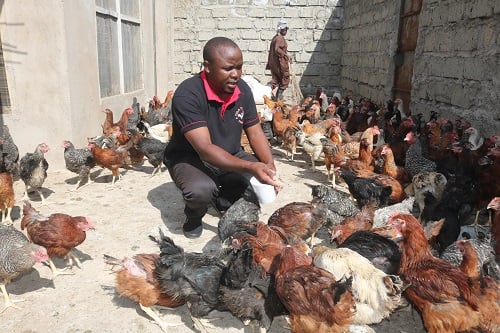Kelvin Kilonzo is a successful entrepreneur who has discovered joy and prosperity in poultry farming.
His journey began at a young age, cultivating a passion that would later blossom into a thriving business model, ensuring that consumers receive poultry products directly from his ‘farm.’
His approach involves adding value to the eggs he produces by hatching chicks. Kilonzo’s foray into poultry farming can be succinctly described as that of a “farmer who knew what he wanted from childhood.”
Starting his poultry venture in Tala, Machakos, he has not only realized but also made it a lucrative enterprise.
During an Interview with Taifa Leo, He reminisces about his humble beginnings, where every coin his mother handed him for shopping or leftovers after purchases went into savings. “Every coin my mother gave me, I would save. Thanks to her generosity,” he shares.
With a capital of just Sh30, he commenced his venture with three chicks, which eventually led to the launch of a substantial project. Despite facing challenges along the way, Kilonzo remained undeterred.
His efforts resulted in a twofold increase in the number of chickens, enabling him to finance his high school education through the proceeds of his poultry business. “For instance, I paid for my Form Three and Four school fees through poultry farming,” he reveals.
After completing his Kenya Certificate of Secondary Education (KCSE) examination, Kilonzo pursued a Diploma in Animal Science, building on his poultry training.
Even during his higher education, Kilonzo continued to enhance his poultry business, incorporating vegetable and tomato cultivation.
Today, Kilonzo stands among the country’s esteemed poultry farmers, managing a significant project in egg incubation for chick production in Kiambu County.
Under his company, Tala Poultry Farmers, he also runs a project for indigenous egg-laying chickens on Kangundo Road, Machakos.
“I started with hatching 200 chicks, and now I have thousands,” he proudly shares. Additionally, he has 20 incubators.
During the interview, Kilonzo was overseeing 3,000 egg-laying hens and an equal number of chicks.
His enhanced indigenous chicken breeds include Kuroiler F1 (originating from India), Rainbow rooster, Sasso (France), Kari, and Kenbrow.
“At times, I hatch up to 20,000 chicks,” he reveals, showcasing the scale of his operations.
His clientele includes non-governmental organizations (NGOs), youth groups, and mothers’ groups from Machakos, Makueni, Nairobi, and Kiambu counties, as well as individual farmers. Additionally, he supplies restaurants and hotels with meat chickens.
In his Kangundo Road project, which focuses on egg production, he collects approximately 85% of the product daily.
The price of day-old chicks is determined by their age, with each costing Sh100. Mature chickens start from Sh800.
As feed costs burden many farmers, Kilonzo has embraced a system of making his own chicken feed, a practice recommended by experts.
“The global rise in the cost of animal feed is an international problem, and for a farmer who wants to stay in businesses like poultry farming, they have no choice but to make their own feed,” advises Dr. Morris Irungu, an expert in the field.
The high cost of animal feed is exacerbated by the high-value-added tax (VAT) imposed on raw materials in the country and the scarcity of those materials. It is estimated that Kenya imports over 70% of raw materials for making animal feed.
By creating his own feed, Kilonzo claims to have reduced the cost of farming by nearly 75%.
In his project, Kilonzo has also adopted a modern system of watering chickens, where birds drink from taps connected to processed channels with reservoirs.

